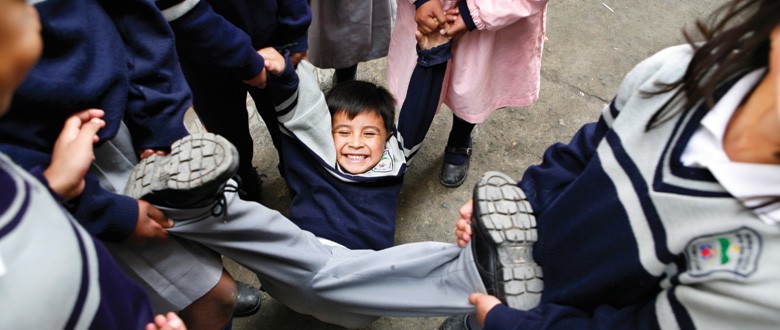
With the current government, in power since November 2006, decennia of strict limitations on investments in the social sector come to an end. In 2008 this translates itself into important investments in favour of the educational sector and it insures the continuity of the policies involved. Some of the new measures are: abandonment of the ‘voluntary’ financial contribution of 25 USD parents had to pay for primary school, financing 12000 new jobs for school teachers, improvement of the educational infrastructure and free distribution of new uniforms and school books. These efforts made by the government are an important backing for the realization of the new VVOB cooperation programme.
The transition from project to programme operation has been realized successfully in cooperation with the Ministry of Education. Five parts of the current programme for the ten provinces have been added to 10-Year Plan for Education 2006-2015. Thus it completely corresponds with local policies.
The school as actor in change
Escuelas Gestoras del Cambio (Schools as Actors in Change) is the multi-year programme of VVOB Ecuador. This programme focuses on schools as a whole. This is in line with the vision and mission of VVOB and it partially builds on the existing experience of VVOB within the sub sector of elementary school (see finished educational projects like PROMEBAZ, PROCETAL and Green Schools). The programme supports the role of the school principals, the teachers and the other school personnel; as well as the school environment in which the parents and the local community play a central role.
There is a special focus on the end users of the education, in particular the people who participate in and around the schools. Therefore we continuously strive for schools which are capable to act as an actor in change to obtain a better education, a higher quality and a warranty for equal opportunities.
To preserve the individuality of the programme there have been contacts with a great number of entities of the ministry, on policy and on executive level. The government officials are always co-organising the events, with the local programme director as responsible and equal counterpart of the programme manager of VVOB.
Alignment with the local policies
The alignment with the local policies increases the relevance of the programme for the partner. The reverse of this situation is that the programme has to take into account any possible changes of the policies. For the associates it is a challenge to find a suitable balance for both the educational programme and the currently running PLANTELplus project. On the one hand they need to assist the policy makers and offer support to the national plans; on the other hand they have to bear in mind the realization of their own goals. This is not always easy, especially in an ever changing context as the one in Ecuador. The architecture of the educational sector is still not stable. For example there is some uncertainty concerning the role of superior education in the new policies. This implicates that we are not sure if the organizations and persons involved will be able to continue their mandates.
Capacity Development
The whole country, including the sector of education, is on the move. Therefore this is the appropriate moment for VVOB to assist the capacity development in Ecuador. Within the realization of the programme the team and the partners at the Ministry of Education mainly work on the operations in the provinces; both concerning the education of teachers, training and assistance as concerning the inspection. This is realized for example through the organization of national and local workshops. In 2008 these workshops result in the publication and the presentation of the baseline study of the programme: ‘Yo miro, yo sueño, yo cambio’ (‘I see, I dream, I change’). The participatory approach of the programme surprises and motivates the participants. The cooperation serves as an educational process for all stakeholders. The programme also succeeds – through the meso level – to reach the schools through interviews with students, teachers and parents.
Cooperation with other donors
Wherever possible the programme collaborates with other donors to obtain a higher impact. We exchange developed didactic materials and good examples of activities on the meso and local level and we coordinate programme activities. This is the case with the present bilateral Luxemburg and Spanish development organizations.
Handing over of projects
The projects are handed over to the local partners. All closing projects (PROMEBAZ, PROCETAL and CEA) have finished in 2008 with the exception of PlanTel. Upon explicit request of the government this project is extended under the name PLANTELplus. On the national level it is amplified with a new and strategic partner: SENPLADES (National Secretary for Planning and Development). There are two fundamental cooperation lines. On the one hand there is technical assistance and further capacity development of the partners. On the other hand it concerns the start of reflections by the different partners concerning the infrastructural planning to obtain a national planning system which provides clarity concerning the responsibilities at different levels.
Challenges in 2009
Based on the results obtained in 2008 the programme Learning Communities would like to start with the national and provincial services of the Ministry of Education in the ten provinces. The goal is to increase the collaboration with and between the schools.




